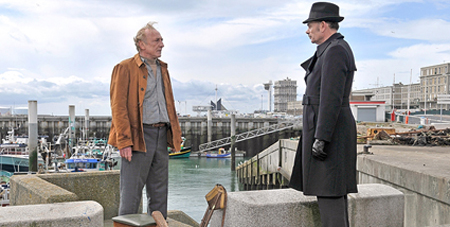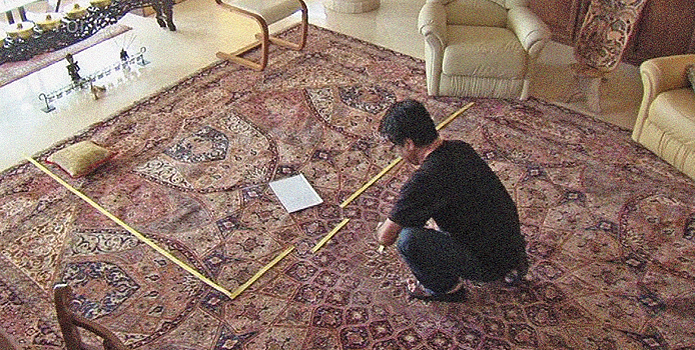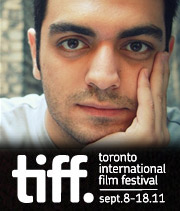TIFF: Spending time with auteurs, illegal immigrants and jailed filmmakers
 Saturday, September 10, 2011 at 12:40AM
Saturday, September 10, 2011 at 12:40AM Hi everyone. Amir here, making my debut on The Film Experience with some festival news from the Great White North.
It was interesting – as it is every year - to see the usually quiet Toronto turn into a total frenzy and the usually laid-back Torontonians line up on the streets to see their favourite stars (which so far has included the likes of Bono, George Clooney, The Goz and Brad Pitt). The greying chilly weather didn’t stop the festivities on the first day and it was only fitting that my festival experience started on a happy note as well with the screening of Aki Kaurismaki’s Le Havre.
 Le Havre
Le Havre
The film centres on an unlikely friendship between Idrissa, a teenage African illegal immigrant and Marcel, an elderly French shoe shiner in the titular harbour in France. As the police forces search around the city to find “the missing boy”, Marcel (Andre Wilms) hides Idrissa and tries to find a way to reconnect him with his mother in London.
Kaurismaki doesn’t deal so much with the socio-political implications of illegal immigration. Instead, he wraps the issue in layer after layer of dry humour and his particular brand of absurdist comedy. Aided by his impeccable comic timing and the terrific deadpan wit of his leading man Andre Wilms, Le Havre makes for a delightful two hours at the theatre.
This is not the type of film that you can read much into. Not to say that there’s no depth, but what Kaurismaki sets out to do is to charm, not to make a statement, and he succeeds at that. Even more charming than the film was Wilms himself, who showed up in person for a Q&A (having clearly indulged in generous amounts of alcohol backstage) and managed to equal his character’s deadpan line delivery with remarks like “French Rock ‘n Roll is like English wine” in reference to a lengthy scene with French rocker Little Bob.
Despite Wilms’ terrific performance, the highlight of the film for me was Jean-Pierre Darroussin’s hilarious turn as the sympathetic inspector Monet whose costume was right out of a Pink Panther movie and his inexpressive face was a perfect fit for this role. At the end of the day, I imagine this is a film everybody will like, but few will love. If you get a chance to see it though, don’t pass up.
 This is not a Film
This is not a Film
The second day’s experience was bitterer, though no less entertaining as I watched This is not a Film, the experimental film by Iranian auteur Jafar Panahi and documentarian Mojtaba Mirtahmasb. If you’re unfamiliar with the story, Panahi is one of Iran’s most important filmmakers and a Venice Golden Lion winner who is now under house arrest for political reasons. Though his situation has stirred much controversy for the vague basis of his charges, he is still serving his 20 year ban – one that includes prohibitions on filmmaking, screenwriting, giving interviews and leaving Iran – and waiting to hear the final verdict on a proposed 6 year jail sentence. Under these extreme circumstances, Panahi sets out to expand his creative limits.
Mirtahmasb takes his camera inside Panahi’s house and films him as he reads and re-enacts his final screenplay in his living room, mapping out the film on his rug “Dogville style” and visualizing the story for the audience. For a society that is reserved about their personal lives to the point of impenetrability, This is not a Film is a major revelation. It’s unprecedented in Iran to see a documentary that goes so intimately inside someone’s house to show him have breakfast, take care of his pets or even get out of bed in their underwear and hang about the bedroom.
 What, I imagine, is more appealing to a universal audience is that this film is one of the best made about the creative process, one that shows the passion filmmakers feel for their craft and the energy they put into it. Panahi tears up as he watches behind-the-scenes footage of his old films and even resorts to filming things with his iPhone just for the heck of it. That a ban as long as twenty years can’t stop him from planning a future film is only a testament to how much he loves cinema.
What, I imagine, is more appealing to a universal audience is that this film is one of the best made about the creative process, one that shows the passion filmmakers feel for their craft and the energy they put into it. Panahi tears up as he watches behind-the-scenes footage of his old films and even resorts to filming things with his iPhone just for the heck of it. That a ban as long as twenty years can’t stop him from planning a future film is only a testament to how much he loves cinema.
The film isn’t short on symbolic imagery either and while the final shot of the film might be too on-the-nose for some, the extensive intermittent footage of Igi, Panahi’s pet Iguana is subtler and more provocative. As the iguana moves around the house and overcomes endless obstacles on its way without ever giving up, it’s hard to miss the allegory of Panahi’s patience in the roughness of the Iguana’s scales and his restraint in its seemingly pointless quest around the house.


